Playing the sucker in “Brighton Rock” (2010)
28 September 2012
We don’t know how old Rose (Andrea Riseborough) is, but we know she’s too young to marry without the permission of her parents. 15? 16? Young enough to be impossibly stupid. Young enough not to know better than to set awful, self-destructive patterns in her relationships with men. Of course she’s the sucker in Rowan Joffe’s Brighton Rock.
 Those glasses, that mass of hair, those little fingers, that drab coat — Rose is accustomed to being invisible. Or worse: frozen out by the other girls at Snow’s, that tea shop on the boardwalk that pretends at gentility. The only kind of attention she gets is unwanted, like when hapless Freddie Hale (Sean Harris) tries to use her as a shield as the rival gang members descend on him to make him pay.
Those glasses, that mass of hair, those little fingers, that drab coat — Rose is accustomed to being invisible. Or worse: frozen out by the other girls at Snow’s, that tea shop on the boardwalk that pretends at gentility. The only kind of attention she gets is unwanted, like when hapless Freddie Hale (Sean Harris) tries to use her as a shield as the rival gang members descend on him to make him pay.
She doesn’t know why Pinkie (Sam Riley, doing a bad Leonardo DiCaprio impression) approaches her and pretends to like her. She lets him pretend.
You want to smack her while she’s on her “date” with Pinkie — and therein lies an insight to her essential weakness. She’s the kind of girl one wants to smack. She’s exasperatingly, willfully blind, even more so after Pinkie points to the St. Christopher medal around her neck and tells her he understands her because they’re both “Romans.”
In establishing their shared Catholicism, they also seem to agree that they represent the different ends of the spectrum: Rose is going to heaven, and Pinkie is most certainly not. Somehow that only makes her love him more. No wonder her boss at the tea shop, the blousy Ida (Helen Mirren), wants to set everything straight again — she sees Rose as a hapless early version of herself.
One feels oddly out of time in Brighton Rock — which is particularly odd because the film is actually quite chronologically specific. At first, watching these hoodlums chase one another through those gloomy streets, one guesses it’s a postwar film (like the original 1947 film, based on the 1938 Graham Greene novel). Neither do the clothes or the sets betray anything different. But when suddenly a lush Doris Day standard fills the corners of the rooms and the characters start talking about out-of-control youth, you feel disoriented (what year is this, anyway?); and when gangs of Mods and Rockers descend on Brighton you realize it’s set in 1964.
One could say a lot of things about that weird chronological uncertainty — that it reveals a lack of focus by the director, or a deliberate attempt to keep us disoriented. Setting aside its effect on the film overall, it has a fascinating impact on our view of Rose.
 For Rose is also out of time — lost, left behind. She pilfers a tenner from Pinkie’s stash of bills to buy herself a great new outfit, yet she enjoys the exhilaration of la mode fashion for only a moment before the self-consciousness and guilt overwhelm her. Not to mention the fact that the pink dress and white tights only exaggerates her youth, undermining any glamour. Rose could never be a part of the zeitgeist, never stutter along to The Who’s “My Generation.”
For Rose is also out of time — lost, left behind. She pilfers a tenner from Pinkie’s stash of bills to buy herself a great new outfit, yet she enjoys the exhilaration of la mode fashion for only a moment before the self-consciousness and guilt overwhelm her. Not to mention the fact that the pink dress and white tights only exaggerates her youth, undermining any glamour. Rose could never be a part of the zeitgeist, never stutter along to The Who’s “My Generation.”
Watching Andrea Riseborough inhabit this role, one would never guess she was 29 at the time of filming — 29, playing a 15-yr-old so completely. Rose doesn’t appear to be the protagonist of this film till quite far along, but she sneakily steals the story from the ridiculous Pinkie and Ida and all the other characters who seem to possess so much more self-assurance and self-direction.
And in the end, perhaps it’s her failures to grasp the big picture — her failure to understand or join her own time — that grant her grace, for they mirror her belief that God loves her despite all her foolish actions, despite her sins.
Brighton Rock can be strangely overwrought and kinetic, not quite a noir and not quite anything else, either; I quite enjoyed it but wouldn’t go far to trumpet its achievements. If you see it, watch it for Riseborough’s sake. This young actor has gone on to receive many nominations and prizes for her work, but this part is a small revelation. I’m keeping my eye on her.
Michelle Williams’ mouth
2 July 2012
Michelle Williams’ mouth is the thing I stare at when I watch her. As an actress she can be a chameleon — I mean, Marilyn Monroe! — but in the end her mouth alone does so much to convey complicated emotions. Her mouth is what always makes her performance so distinctive.
Her mouth has gravity. Her mouth shows her disappointment, her struggles. Michelle Williams has the mouth that belies all her other beautiful attributes. Even when she enacts (very effectively) the lusciousness of Monroe, her mouth brings us back:
Whereas the real Monroe’s mouth only confirmed our mythos about her (tongue is in evidence):
Readers will know that I’ve always got my eyes open for actresses who break out of the ridiculously strict Hollywood standards when it comes to noses, mouths, body size, and other body parts so frequently adjusted by plastic surgeons. Now, don’t get me wrong: I’m certainly not saying that Michelle Williams’ mouth is unattractive or shaped oddly — far from it. Williams is a beautiful woman in many, many conventional ways.
And yet. Her full cheeks and mouth do things that render Williams’ conventional beauty so much more interesting. Her mouth almost makes me think that she doesn’t truly know how beautiful she is.
Her mouth can do things that Monroe’s refused to do: be hard, express shame or blubbering lack of control, convey a lifetime of disappointment. Whereas it seems impossible for Monroe to appear plain, Williams is at her brilliant best when that mouth draws downward and all we can see is her bald emotions, her character’s true despair.
Think about her role in Brokeback Mountain (2005) as Alma, that ordinary little thing who marries Ennis Del Mar (Heath Ledger) knowing they’ll have a hard life together. They’re both quiet (bordering on silent, really) and dirt-poor, and once the babies start coming they’ll be poorer. That’s okay with her. It’s not like she expected anything else; she knows they’ll get old and stiff long before they ought to. But then she sees her husband kissing his friend Jack with a passion, sheer hunger and the attention she’s never gotten from him, not even once:
That bottom lip of hers is so full, so heavy. At first she’s just registering all this new information — she’s so stunned she doesn’t know how she feels. Then she knows only that she’s hurt, and the mouth drops. She’s so close to becoming ugly, and she knows she’ll be ugly if she cries.
She lets herself be ugly when they fight. She’s too angry to care anymore. She doesn’t know whether to be afraid or dare to believe that she’s the one with the power now.
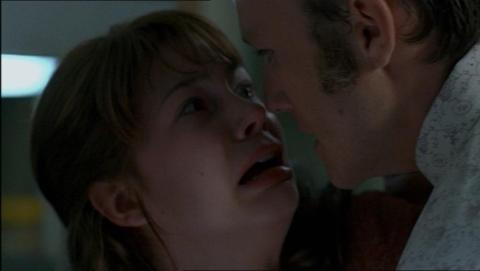
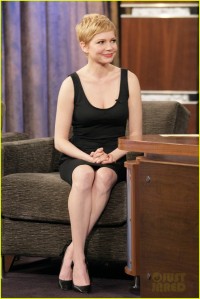 That’s Williams at her most extreme, the far end of the spectrum from her Interview Face. When she sits for interviews, she disguises her expressive mouth behind a lovely and enigmatic smile. She is very good at appearing so self-possessed as to be quite evasive, as if she’s an ideal 19th-century demure heroine.
That’s Williams at her most extreme, the far end of the spectrum from her Interview Face. When she sits for interviews, she disguises her expressive mouth behind a lovely and enigmatic smile. She is very good at appearing so self-possessed as to be quite evasive, as if she’s an ideal 19th-century demure heroine.
Get it, people? She is just beautiful — a woman with spectacular cheekbones and an ability to pull off that pixie haircut. If this was all we ever saw, I’d have nothing much to say.
If I’m going to be honest, I’ll admit that what I find so great about her mouth is that it has the same natural droop as some of those older women in my family — you can see it in photos of my hardworking, stone-faced granny when she was middle-aged and saddled with an alcoholic husband. You can see it in the family photos of those other abuelas who picked cotton and had too many children and worked in canneries and stayed poor all their lives.
So maybe part of my love for that mouth is the fact that she can harness it in her acting to evoke other lives.
Williams is still too young (she is 31) and too sweet-cheeked to show the lines around the mouth that my granny had, of course. But with characters like Emily Tetherow in Meek’s Cutoff (2010) and even Cindy in Blue Valentine (2010) she shows that she can look far older than she is, far too aware of the dark side, caught in vise-like gender traps.
She has that capacity to look emotionally bruised, resigned, on the brink. She somehow encompasses both fragility and a growing hardness.
I never watched her first big role in Dawson’s Creek (1998-2003) as Jen, the city girl who grew up too fast and got sent down to live with her grandmother in a more restrained setting. From the photos I’ve seen, she appears as a far more glamorous pretty girl than I’ve seen her from her career as the darling of independent film. I prefer the latter-day Williams, discovered and used to such effect by Kelly Reichardt in Wendy and Lucy (2008) and later in Meek’s Cutoff. To find someone to inhabit the roles of these quiet women who wrangle with overwhelming problems, Reichardt needed someone with a face.
Reichardt needed someone with a face that could indicate a complicated personal history because her films don’t belabor those back stories. You need to be able to look at Wendy’s face (below) and know that, when things get complicated, she might not have the strength to face it all, partly because she’s had to face hard things before.
I’ve been marveling lately at an emotion you don’t often see on American actors’ faces, but which British actors in particular excel at: self-disgust. Nor is this emotion limited to character actors with funny faces. This emotion is most striking when it appears on the face of a strikingly attractive person. I think I first noticed it when I saw Helen Mirren in Prime Suspect (maybe even that first series, all the way back in 1991), but I’ve seen Tilda Swinton, Richard Armitage, Pierce Brosnan (of all people) and even Hugh Grant (when he’s not being a toothy douchebag) show us that they can be susceptible to the same private self-loathing as the rest of us. Mirren and Swinton are especially good at showing us that expression when they look at themselves in bathroom mirrors.
Michelle Williams hasn’t quite gotten all the way to self-disgust. Or at least I haven’t seen it yet. But we see other dark moods cross her face that aren’t quite so clear-cut. And when they do, that’s when her acting becomes most lyrical.
She’s so good at becoming that character who goes inside herself, who shuts herself off as in Blue Valentine, or who flits between her fear of uncertainty and her temptations to adultery in Take This Waltz (2011). She’s one of those actors who fosters an extraordinary relationship with her viewers (perhaps even most her female viewers, who recognize those facial expressions?) because of her seeming isolation, her impulse to make herself invisible, and the emotional gymnastics it takes for fragile people to deal with isolation.
Sometimes it just takes a small purse of the lips. To allow one’s eyes to get a bit more hooded.
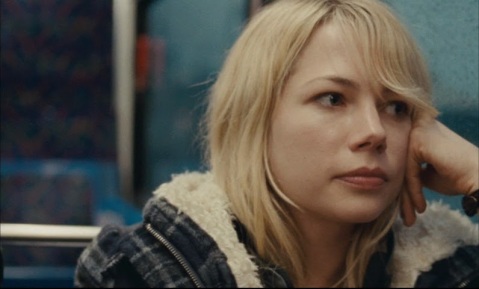
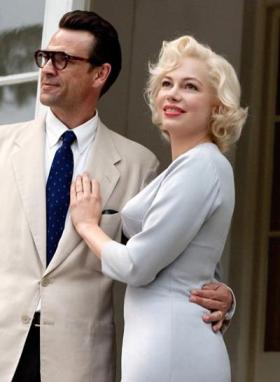
Which brings me back to the odd choice of opting to portray Monroe. Why would an actress do that to herself? Why would an actress be persuaded to step into the shoes of a woman so iconic, so famed for her beauty and full-to-bursting sensuality?
For Michelle Williams to take on the role of Marilyn Monroe is not equivalent to Meryl Streep’s roles as real-life/ historic figures. Honestly: to me it sounds like a nightmare. Who among us could survive the inevitable comparisons, the naysayers who say she’s not beautiful enough to play Monroe?
Yet after thinking so extensively about Williams’ mouth and its frequent on-screen plunges downward, its gravity and its evocation of disappointment and pain, I have now determined that this must have seemed like the most extraordinary physical challenge for an actor. She has spoken extensively about gaining weight for the role and learning how to wiggle across a room with curves (whereas Williams is normally a tiny slip of a thing, like all actresses these days).
Yeah, whatever. Actors are always gaining/ losing weight and making a big noise about it, like they want to be congratulated for how hard it is. If you ask me, the real challenge was to use her mouth differently, and thereby the rest of her face. She had to loosen up her mouth, widen her eyes, adopt a new openness and insecurity to convey a wholly different breed of fragility.
In a Vogue interview, Williams said some fascinating things about stepping into this part by thinking about Monroe’s relationship to the world:
Someone once said that Marilyn spent her whole life looking for a missing person — herself. And so she cobbled together what people thought, felt, saw, and projected onto her and made a person out of it. She had no calm center inside herself that she could come home to and rest.
The challenge was to play a person so eager to please, so eager to be visible. Marilyn’s mouth always conveyed her availability; even 50 years after her death, a photo of her will make you want to run your tongue all over her beautiful open lips. What could be a better challenge for an actor like Williams — who’s prone to such a rigid private reserve — than to try to become that woman who “had no calm center inside herself”?
It’s too bad My Week With Marilyn wasn’t a better film. But that’s really beside my larger point. Someday soon I’m going to rent it again just to watch again how Williams loosens up the bottom half of her face for the role, and think again about how it contrasts with her versions of hard, disappointed, downtrodden women like Alma and Wendy.
Is there another actor out there whose mouth does so much of the heavy lifting in her acting? And in the meantime, have you gotten around to seeing her in Take This Waltz yet?
The exceptional Mirren exception
7 March 2011
Helen Mirren is the exception. At 65 she’s getting a ton of work, is widely recognized as a top-notch actor (and “national treasure” in the UK), and has just as many online photos of her in a bikini as Mila Kunis. Moreover, she’s getting work that’s fantastic, and not just a bunch of queens. Julie Taymor converted one of Shakespeare’s canonical male roles into a woman, Prospera, for last December’s The Tempest; then there’s R.E.D.‘s Retired, Extremely Dangerous killer Victoria; Sofya Tolstoy in The Last Station (2009)…. Remember how the peevish Ellen in the wonderful show Slings and Arrows used to talk about an actress’s career as going from the ingénues to the queens to the “dreaded nurse” parts? Mirren has gone from queen to king — and people online call her a GILF. (People online are jackasses. But if I had my chance…) In contrast, I remember reading something about how Meryl Streep had “let herself go.” People online are jackasses.
But rather than simply hoover up all the best parts, pull up the ladder after herself, and show up in flattering gowns to awards events, Helen Mirren speaks openly, frankly, and eloquently on the complexities of age and gender onscreen. Here she appears truly exceptional: she acknowledges that she’s an exception to the rule. My favorite is her speech accepting the Sherry Lansing Leadership Award in December. But she’s appeared in many other interviews just recently now that The Tempest is due to appear in theaters in the UK; see here for an interview in The Guardian — many thanks for that link, JE — as well as on the Film Weekly podcast. In that latter interview she discusses the career problems faced by her young female co-star in The Tempest, Felicity Jones, who’s dying for a part in which she doesn’t have to cry prettily. That’s one problem for young actresses, Mirren opines: “you’re always sniveling in a corner somewhere” onscreen.
I have a colleague who’s a golden boy — he can’t seem to do anything wrong, according to my senior/important colleagues. I tried to talk to him one time about how white male privilege works in my department and he got angry, as if I’d implied he didn’t deserve the plaudits he’d received. No, all I mean is that if you’re the exception, you’ve got to be exceptional and not act as if it’s the very least you deserve.
Helen Mirren hoiks her spanx
10 December 2010
Helen Mirren received the Sherry Lansing Leadership Award on Wednesday at the annual Hollywood Reporter Women in Entertainment breakfast, and used the opportunity to fiddle with her underpants (“hoik my spanx,” to the utter delight of the entire room) and speak the truth about women in film. “With all respect to you many brilliant and successful women in this room, really not much has changed in the canon of Hollywood filmmaking that continues to worship at the altar of the 18- to 25-year-old male … and his penis,” she explained when talking about the struggles of older women to get parts. As I noted in an email to my sister earlier today, I really must make a mental note to be more like Helen Mirren.
One cranky final word: why is it that these events so frequently take place as the “women’s breakfast”? I’ve attended many “women’s breakfasts” at professional conferences in my academic field and every time I wonder why it’s not a “women’s cocktail party.” Truly: there’s nothing particularly glamorous about dragging oneself to a 6:30am bowl of fruit with weak coffee in one of those bleak conference hotel ballrooms. (Of course, we don’t have Helen Mirren types giving rousing speeches. Maybe that’s my true complaint.)
Audacity and love with Julie Taymor
7 November 2010
I want to be Julie Taymor. Or am I in love with her? As I eagerly anticipate her forthcoming movie, “The Tempest” with Helen Mirren as Prospera (and oh, how I swoon at the idea of a female Prospero), I’ve been remembering everything I’ve loved of hers recently and thinking how much warmth and drama she constructs with her wide-ranging work. I love her for the highbrow quality of her directing (the operas “The Magic Flute” and “Grendel;” and all that Shakespeare, including the 1999 film “Titus”); I love her for “Across the Universe” (2007), the lovely Beatles music-inspired film; and I can only wish I spent enough time in New York to see her upcoming Broadway musical, “Spider-Man: Turn Off the Dark,” for which she co-wrote the book as well as directed. She’s a marvel. She’s audaciously dedicated to beautifully imaginative staging and design, but it’s not for the mere esoteric pleasure of looking; it’s a self-consciously theatrical directorial choice, but one that enhances our experience of the content. She makes us fall in love with art in all her work. Just look at these scenes from “Across the Universe” to get a sense of the way she loves to frame a shot, balancing the beauty of a face with a perfectly-timed version of “Hey Jude” that folds in other voices at just the right moments:
Before “Glee” started offering us new interpretations of hoary old favorites, “Across the Universe” nearly broke my heart with its slowed-down, careful versions of those classics. It’s not just that the actors are so lovely, and that they have such beautiful, perfect voices (and that I’ll never be able to look at Jim Sturgess again without seeing his physiognomic combination of Paul and George). It’s that by slowing down these songs and singing them with such love, the actors show me something new there that I haven’t heard in a long, long time. In fact, I think “Glee”‘s recent (great) re-singing of “I Wanna Hold Your Hand” is a nearly note-for-note ripoff of T.V. Carpio’s version from the film:
Combined with that breathtaking cinematography, Taymor heightens all your senses: you find yourself rapt, trying to absorb all that detail and the big sweep of a beautifully constructed scene. She raises us up to see art’s role in the lives we wish we were leading. It reminds me of a line from Stephen Holden’s NY Times review of the film in which he commented, “Somewhere around its midpoint, ‘Across the Universe’ captured my heart, and I realized that falling in love with a movie is like falling in love with another person.” Think about her work on “Frida” (2002), in which she somehow captures the experience of falling in love with the rebellious, transformative aspects of art and revolution. It’s true that I don’t feel the same kind of tremendous, heartbreaking love for Shakespeare as I do for the Beatles or early 20th century Mexican art, but in “Titus” too, I find myself gazing at what she did with Jessica Lange’s and Anthony Hopkins’ faces — encrusting them with mud or gold paint to heighten our experience of the story as a whole.

“Titus” was the most theatrical of her films, which makes me curious to see what she’ll do with “The Tempest.” It’s audacious on its own to expect December movie audiences to go out to the cineplex for Shakespeare (I mean, we could go see the new “Harry Potter” instead), yet the early release of images from the film spark the same excitement that I experience watching that amazing car crash scene and animated hospital sequence from “Frida.”

There are many wonderful interviews with Taymor in which she explains her methods, but I was struck by this one from Subtitles to Cinema in which she explains that she tries to boil the central story down to an idiograph. “It’s like in old Japanese paintings – if you were to paint a bamboo forest, you should be able to find its essence with only three strokes,” she explains. In the same way, she seeks the essence of her tales with a visual image. “Like a cubist painter, I want to open up the image and give you a fresh perspective. That is my job. And cinema makes it possible.”
December 10 — that’s when “The Tempest” is due out. Helen Mirren could do with a good film after appearing in a series of duds this year (boy, it was depressing to see those reviews of “RED” and “Love Ranch” that, while giving Mirren her due, wrung their hands of the films), and I love the fact that the film nearly coincides with the opening of the “Spider-Man” musical on Broadway. Yup: I want to be Julie Taymor. And just sit back and admire her from afar.
Sir Helen Mirren and being sexy
28 June 2010
At 65, Helen Mirren has a new film coming out: “Love Ranch,” in which she stars as the madam of a Nevada brothel in the 70s. Her character manages the prostitutes with such an iron fist that her pig of a husband (Joe Pesci) screams at her, “Who do ya think you are, the Queen of fuckin’ England?” (This line alone is the very best possible advertisement for this film, as far as I’m concerned.) For a somewhat absurdly prurient interview reflecting on her long career being sexy, she posed nude in the bath this month for New York Magazine, and this seems to be a source for one of those “should she or shouldn’t she?” debates. Honestly? Someone out there is looking to tell Helen Mirren whether to strip? I have no such hubris. She has had a long career of being sexy, such that it put me in mind of something Tilda Swinton said recently about being knighted, to the effect that Sir Helen sounds much better than Dame Helen. This entire conversation makes me realize that when journalists and the public don’t know what to do with an exceptionally intelligent, attractive, and successful woman, they turn the conversation into one about sexiness.
 American viewers like me didn’t really get much of Helen Mirren until she was in her mid-30s, and I first knew her in the “Prime Suspect” series made when she was well into her 40s. The first episode (1991) was a revelation to me, not least because it followed so quickly on the heels of Anita Hill’s allegations of sexual harassment against Clarence Thomas during his Supreme Court hearings during the Fall of 91. As a result, Mirren’s version of DCI Jane Tennison — steely, professional, brilliant, occasionally abhorrent, and daily faced with men’s obstreperousness — seemed pitch-perfect for the age. Her very body language showed a lifetime of keeping her body in check in a male-dominated world; she covered herself in unsexy suits and kept her face impassive. She was sexy to us viewers because she was so exceptionally smart and real, not because she displayed any kind of prurient sexuality onscreen. Women viewers could so many things into a closeup of Mirren’s face: intelligence, weakness, self-loathing, pride, self-possession, and all that in a single look. This was why she was so appealing to us, not because she took off her clothes. Let’s also not overlook the fact that for a woman actor to achieve such international fame only starting in her mid-40s is well-nigh unprecedented.
American viewers like me didn’t really get much of Helen Mirren until she was in her mid-30s, and I first knew her in the “Prime Suspect” series made when she was well into her 40s. The first episode (1991) was a revelation to me, not least because it followed so quickly on the heels of Anita Hill’s allegations of sexual harassment against Clarence Thomas during his Supreme Court hearings during the Fall of 91. As a result, Mirren’s version of DCI Jane Tennison — steely, professional, brilliant, occasionally abhorrent, and daily faced with men’s obstreperousness — seemed pitch-perfect for the age. Her very body language showed a lifetime of keeping her body in check in a male-dominated world; she covered herself in unsexy suits and kept her face impassive. She was sexy to us viewers because she was so exceptionally smart and real, not because she displayed any kind of prurient sexuality onscreen. Women viewers could so many things into a closeup of Mirren’s face: intelligence, weakness, self-loathing, pride, self-possession, and all that in a single look. This was why she was so appealing to us, not because she took off her clothes. Let’s also not overlook the fact that for a woman actor to achieve such international fame only starting in her mid-40s is well-nigh unprecedented.
 It was similar with her acting in “The Queen” (2006), in which again she could be utterly despicable and absolutely sympathetic in rapid succession from one scene to the next. It was those scenes of her locked away at Balmoral during the English national mourning for Diana’s death — her personal dedication to a certain tight-lipped version of reality, and her slow realization that she was sadly out of touch — that made Mirren appear again so compelling as an actor. In an era when women are loath to let themselves be bitches (and I speak for myself and every other female college professor out there, and likely for everyone else over 30 too), Mirren’s characters display how one can be bitchy and appealing at the same time. It made her all the sexier to me, and I wonder if American women could learn something from the mix of hardness and softness: in an ideal future the antifeminist conversation we’ve been having about what makes a woman sexy, feminine, or bitchy simply cannot hold, such that a new version of femininity is due to arrive that celebrates a considerable degree of intelligent steeliness. Her performance in “The Last Station” (2009) was similar: her take on the histrionic Sofya showed her to be highly emotional, yet also far more astute about the nature of marriage than her idealistic husband, Tolstoy (Christopher Plummer). “Why should it be easy?” she demands from him in one of my favorite scenes. “You are the work of my life and I am the work of yours. That’s what love is.”
It was similar with her acting in “The Queen” (2006), in which again she could be utterly despicable and absolutely sympathetic in rapid succession from one scene to the next. It was those scenes of her locked away at Balmoral during the English national mourning for Diana’s death — her personal dedication to a certain tight-lipped version of reality, and her slow realization that she was sadly out of touch — that made Mirren appear again so compelling as an actor. In an era when women are loath to let themselves be bitches (and I speak for myself and every other female college professor out there, and likely for everyone else over 30 too), Mirren’s characters display how one can be bitchy and appealing at the same time. It made her all the sexier to me, and I wonder if American women could learn something from the mix of hardness and softness: in an ideal future the antifeminist conversation we’ve been having about what makes a woman sexy, feminine, or bitchy simply cannot hold, such that a new version of femininity is due to arrive that celebrates a considerable degree of intelligent steeliness. Her performance in “The Last Station” (2009) was similar: her take on the histrionic Sofya showed her to be highly emotional, yet also far more astute about the nature of marriage than her idealistic husband, Tolstoy (Christopher Plummer). “Why should it be easy?” she demands from him in one of my favorite scenes. “You are the work of my life and I am the work of yours. That’s what love is.”
 In the new film as the queen of the brothel, her character deals with her horrible husband and a cancer diagnosis by undertaking a torrid affair with a young boxer thirty years her junior (online photos of the actor Sergio Peris-Mencheta make him look like an even more Hollywood-ready version of Rafael Nadal, if such a thing were possible). Despite the titillating account in the New York Magazine article, I doubt Mirren took this part because it allows her to look like a 65-year-old cougar. In this regard the article is inherently weak and reveals in its very quotes from her that its overall portrayal of Mirren as a sexpot is flawed. Take the following:
In the new film as the queen of the brothel, her character deals with her horrible husband and a cancer diagnosis by undertaking a torrid affair with a young boxer thirty years her junior (online photos of the actor Sergio Peris-Mencheta make him look like an even more Hollywood-ready version of Rafael Nadal, if such a thing were possible). Despite the titillating account in the New York Magazine article, I doubt Mirren took this part because it allows her to look like a 65-year-old cougar. In this regard the article is inherently weak and reveals in its very quotes from her that its overall portrayal of Mirren as a sexpot is flawed. Take the following:
As Mirren explains it, she struggled to get a handle on her own sexuality in order to use its power to accomplish her ambitions. “The Playboy Mansion, coke, and the rise of all that — Guccione and Hefner always pushed it as liberation, but it didn’t seem like that to me,” she says. “That was women obeying the sexualized form created by men — though maybe we always do that, because we want to be attractive. But I was kind of a trailblazer because I demanded to do it my own way. I’d say, ‘I’m not having it put on me by someone else.’ I didn’t want to be the sort of puritanical good girl with a little white collar who says, ‘Don’t shag until you get married.’”
The resulting phony “debate” about whether Mirren should have stripped for the magazine’s photo shoot reveals that we’re trapped in a pornified conversation about women and sexiness. In this quote she criticizes the terms of that very conversation, but the magazine can’t quite grasp what might lie outside it, so it offers her up as some kind of GILF (for example, it reminds readers of the paparazzi photos of a couple of years ago showing her looking pretty goddamn awesome in a red bikini). Oh for fuck’s sake. Sexing her up allows writers to take her a little less seriously as one of the most stunning actors of her generation. But in doing so they overlook her real appeal, and that just makes me tired.




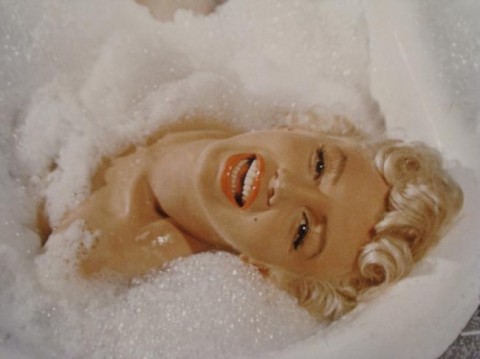
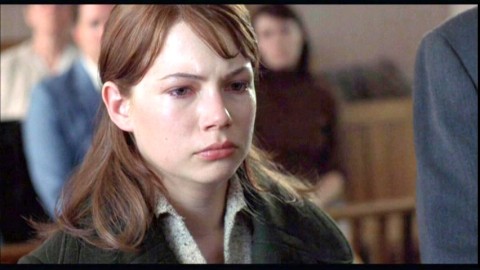
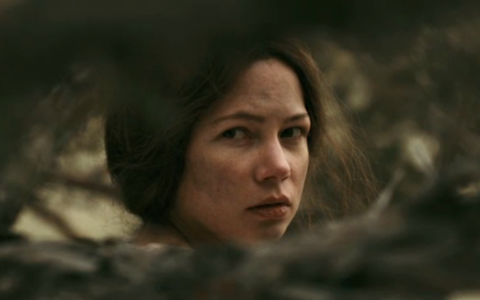
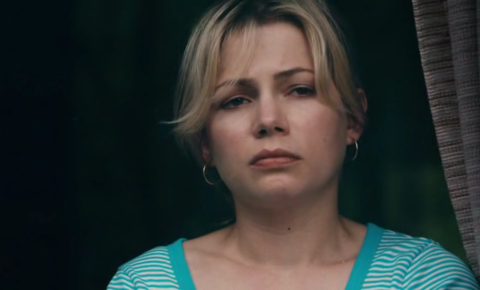

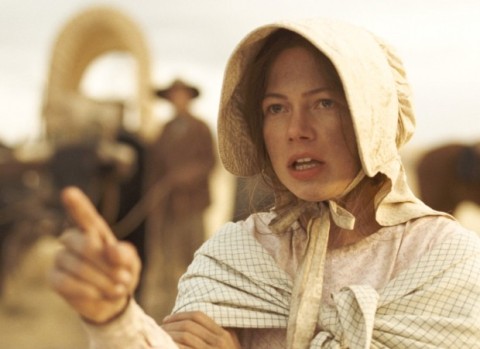
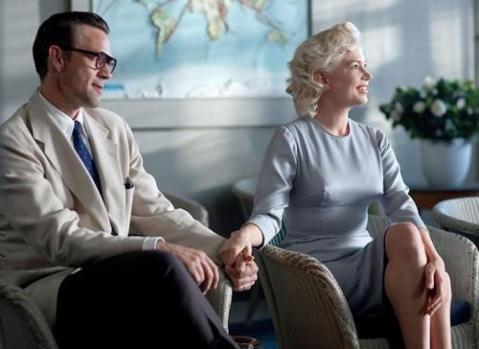













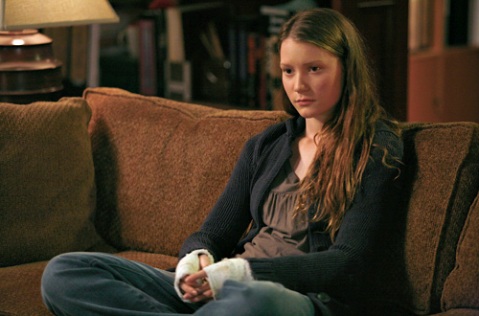
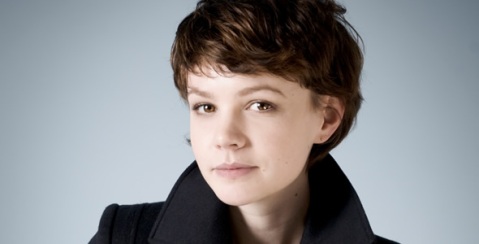
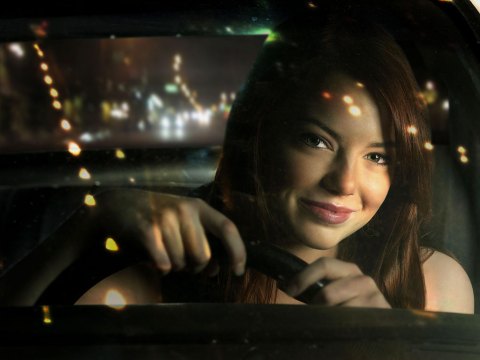
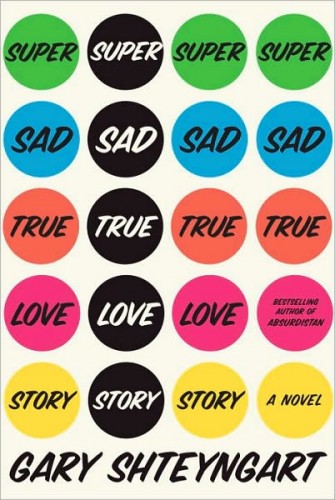
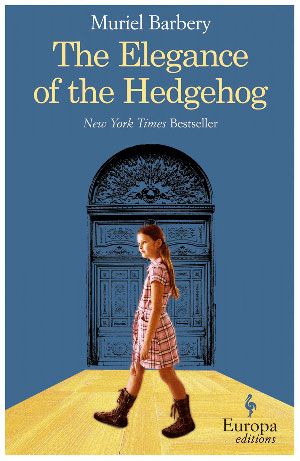 I’ve plunged myself into Muriel Barbery’s wonderful novel, The Elegance of the Hedgehog, which moves back and forth between the interior monologues of two brilliant women: the autodidact Renée, who hides behind her mask as an unkempt, sullen concierge in an elegant Paris apartment building; and Paloma, the precociously intelligent 12-year-old who lives upstairs and despises the pretentions of her family, teachers, and classmates. They seem to be on a path to discover one another — but I’m at the point in the novel when I’m so enjoying just listening to them think out loud that I’m not sure I care whether the narrative goes anywhere (Paloma has a diatribe about why grammar is about accessing the beauty of language that’s so wonderful I’m thinking of plagiarizing it for use in my classes).
I’ve plunged myself into Muriel Barbery’s wonderful novel, The Elegance of the Hedgehog, which moves back and forth between the interior monologues of two brilliant women: the autodidact Renée, who hides behind her mask as an unkempt, sullen concierge in an elegant Paris apartment building; and Paloma, the precociously intelligent 12-year-old who lives upstairs and despises the pretentions of her family, teachers, and classmates. They seem to be on a path to discover one another — but I’m at the point in the novel when I’m so enjoying just listening to them think out loud that I’m not sure I care whether the narrative goes anywhere (Paloma has a diatribe about why grammar is about accessing the beauty of language that’s so wonderful I’m thinking of plagiarizing it for use in my classes).




